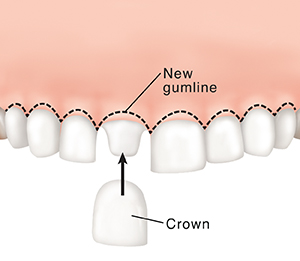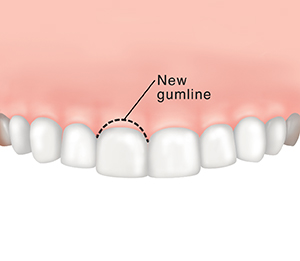A
B
C
D
E
F
G
H
I
J
K
L
M
N
O
P
Q
R
S
T
U
V
W
X
Y
Z
Click a letter to see a list of conditions beginning with that letter.
Click 'Topic Index' to return to the index for the current topic.
Click 'Library Index' to return to the listing of all topics.
Crown Lengthening Surgery
Does your gumline look uneven or do your teeth look short? Or do you need a tooth fixed but your gums cover too much of the crown? A type of gum surgery called crown lengthening can recede or even out the gumline. The surgery may be done for functional or cosmetic reasons. It can be done if more tooth structure needs to be exposed for the tooth to be restored. The surgery exposes more of the crown. This is the head of the tooth you can see above the gum line.
How crown lengthening works
Surgery to expose more of the crown includes:
-
Functional lengthening. In some cases, decay or a fracture goes below the gum line and a restoration (crown) is needed. Gum and bone are removed to expose enough tooth to anchor the new crown. This also helps prevent future damage to gum and bone near the restoration.
-
Cosmetic lengthening. This is done to correct an uneven gum line or remove an overgrowth of gum and, in some cases, bone tissue that causes a “gummy” smile. It can improve your appearance and may make teeth easier to keep clean.
 |
| Functional crown lengthening: This corrects the gum and bone level by allowing the tooth to be exposed more, so the tooth can be restored. |
 |
| Cosmetic crown lengthening: Removing or reshaping gum and bone tissue can help improve your smile by exposing more of the natural tooth, or by evening out your gumline to create a less "gummy" smile. |
Online Medical Reviewer:
Jessica Gotwals RN BSN MPH
Online Medical Reviewer:
Michael Kapner MD
Online Medical Reviewer:
Rita Sather RN
Date Last Reviewed:
12/1/2022
© 2000-2025 The StayWell Company, LLC. All rights reserved. This information is not intended as a substitute for professional medical care. Always follow your healthcare professional's instructions.